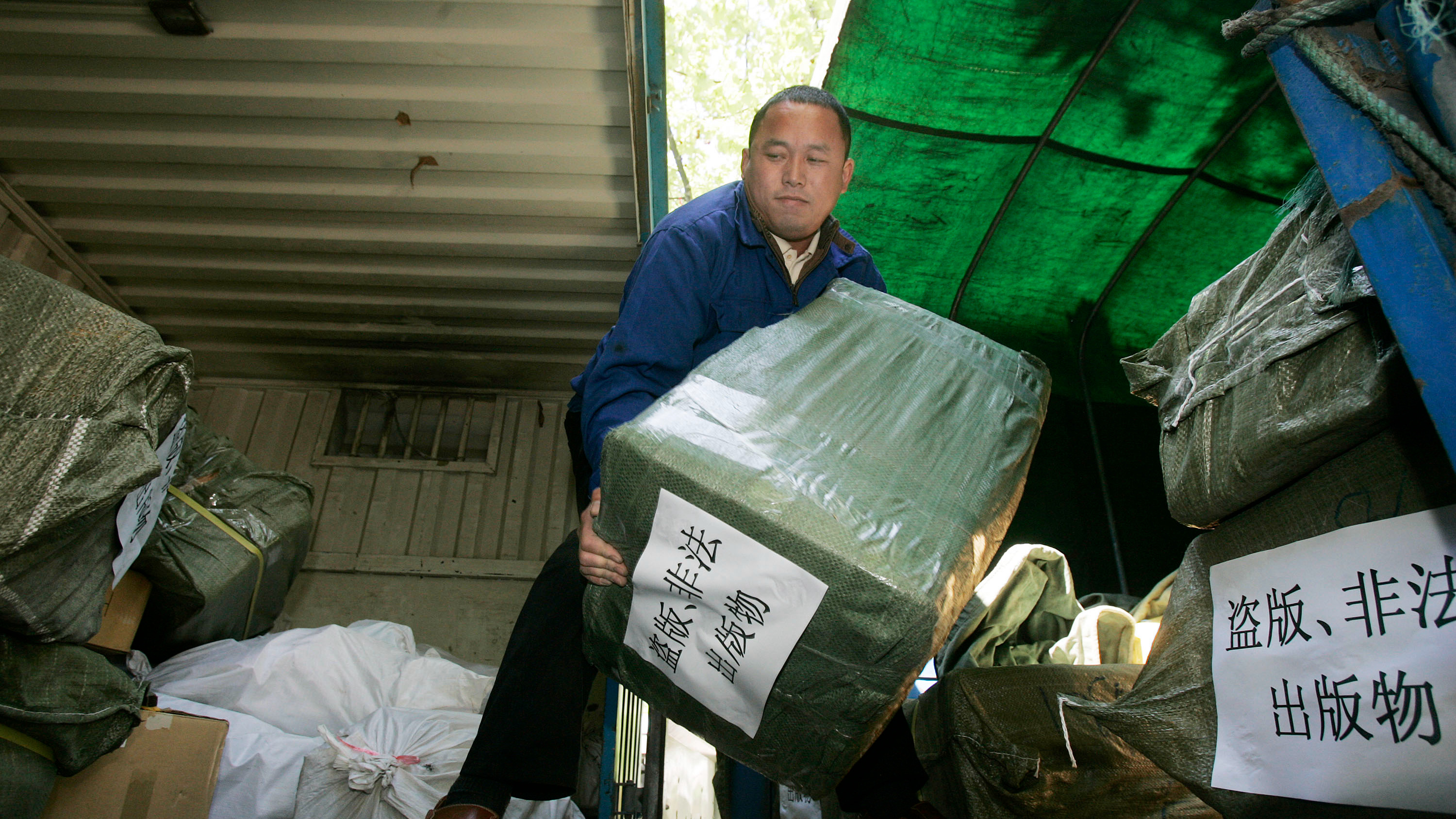
A worker moves packages of pirate material during an event to destroy illegally copied media in Shanghai, China, April 20, 2008. /Getty
A worker moves packages of pirate material during an event to destroy illegally copied media in Shanghai, China, April 20, 2008. /Getty
Editor's note: He Jing and Fang Yi are attorneys at GEN Law Firm. The article reflects the authors' opinions, and not necessarily the views of CGTN.
On February 1, 2021, Qiushi, the CPC Central Committee's flagship journal, published an important article by President Xi Jinping on "comprehensively strengthening the protection of intellectual property rights and stimulating the vitality of innovation to foster a new development paradigm." This article is based on the president's speech delivered on November 30, 2020 at the 19th Political Bureau of the CPC Central Committee's 25th Group Study Session, providing an opportunity to understand how President Xi sees IPR work in China and in the world.
President Xi's speech shows an unprecedented level of importance placed by China's central leadership on the protection of intellectual property rights. In the article, President Xi starts with the fundamental understanding that innovation is the primary driving force behind development, and that protecting IPR is equivalent to protecting innovation. Xi further explains that stringent IPR protection is vital to the modernization of governance system, high-quality economic growth, quality of life, the country's opening-up economy and national security.
President Xi looks back on China's historic accomplishments in intellectual property protection since the early days of the Republic. He asserts that China has now come to the transition point from a major IPR importer to a major creator of IPR. This statement is significant as it acknowledges China's commitment and capacity in innovation and creativity.
President Xi is also frank and open regarding various deficiencies in the current state of affairs of IPR protection, such as the lack of high value IP, challenges in IP enforcement, increasing complexity in dealing with technology related IP infringement, and difficulties in resolving overseas IP disputes.
The core issue of the article is the six-aspect roadmap Xi presents in IPR protection from the level of national strategy and new development plan.
First, China will set out a top level design plan for IPR protection based on accurate reading of both domestic and international trends. The plan should incentivize innovation, support and promote high-quality development, and satisfy the needs of people's pursuit of happiness. This calls for the urgent making of an IPR-based national prosperity strategy for "the 14th Five-Year" period with clear goals, tasks, measures, and a blueprint.

A roller crushes pirated media products during an anti-piracy campaign in Changchun, northeast China, April 26, 2006. /Getty
A roller crushes pirated media products during an anti-piracy campaign in Changchun, northeast China, April 26, 2006. /Getty
Second, China will focus on legislative and enforcement aspects of IPR work. Well-developed legislations on intellectual property and highly efficient administrative and judicial systems lay the ground for the strengthening of IPR protection. In view of the recent legislation of the Civil Code, China will work fast to update legislations such as the Patent Law, Trademark Law, Copyright Law, and Antitrust Law. Legislation on geographical indications and trade secrets should be paid special attention. Civil procedures and criminal enforcement should all be enhanced through new rule-making efforts. Notably, administrative enforcement is called for in going after IP infringement in hotspot areas with full deterrence.
Third and fourth, President Xi calls for systematic development of the entire IP protection and IPR reforms. He sees IPR protection work as the interplay of multiple mechanisms, including judicial, administrative, economic, technical, and social governance measures. To provide systematic protection of IPR, China needs to build a national IPR big data center and public service platform to publish IPR related information using AI and big data technologies in a timely fashion. At the same time, legal reforms are required for providing better protection for various fields, such as AI, big data and genetic engineering, as well as traditional knowledge and culture. Punitive damages, adjudication of technology IP lawsuits, IP abuse, IP evaluation are also among the focal points for continued enhancement and reforms.
Fifth, China needs to promote more international cooperation in the IPR field and at the same time China will handle contentious aspects of IPR properly, given the fact that IPR is often a key issue in trade disputes. As a responsible member of the international community, China should engage with global IPR governance under the framework of World Intellectual Property Organization (WIPO) and push for the improvement of IPR related international standards and rules for trade and investment. This is very much anticipated given the recent announcement that China is highly interested in joining CPTPP and supporting WTO reforms.
Finally, China will safeguard its national security interest in the fields of IPR. China should invest more heavily in the development and protection of core technologies relevant to national security, and implement legal measures over technology exports that affect national security. In order to achieve this, China needs to further develop systematic legislations on unfair competition and antitrust issues. China should also provide service and legal aid concerning IPR protection to Chinese entities that conduct business overseas.
President Xi's speech and the Qiushi article on IPR protection paint a new future for China IP system. WIPO has recently upgraded China on its Global Innovation Index to No. 14, further evidencing China's IP capacity. China's commitment to developing its IP system as a national strategy will create more opportunities for IP owners, different industries, and consumers all over the world.
(If you want to contribute and have specific expertise, please contact us at opinions@cgtn.com.)

